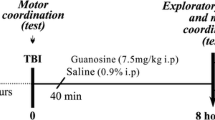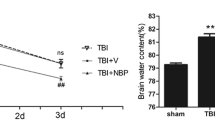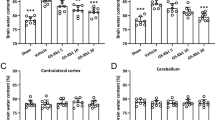Abstract
Metformin is an activator of AMP-activated protein kinase (AMPK). Thus, it has the potential to restore energy in damaged neurons and attenuate secondary brain damage due to traumatic brain injury (TBI). This study aims to investigate the potential neuroprotective effects of metformin through the energy balance reestablishment in acute severe brain injury after TBI and explore the underlying mechanisms. Male Wistar rats were divided into eight groups. The veterinary coma scale (VCS) was used to assess short-term neurological deficits. Blood-Brain barrier (BBB) disruption was evaluated by Evans Blue method 6 h post-injury. Vestibulomotor function was evaluated by beam-walk and beam-balance methods. Brain water content and brain tissue phosphorylated and total AMPK were assessed by the wet/dry method and enzyme-linked immunosorbent assay (ELISA), respectively. In order to eliminate the effect of AMPK, compound C was used as an AMPK inhibitor. The presented study showed that TBI has led to significant brain edema, BBB disruption, neurological deficit, vestibulomotor dysfunction and decrease AMPK phosphorylation in the rat brain. Metformin (100 and 200 mg/kg doses) attenuated brain edema, improved BBB and vestibulomotor dysfunction compared to TBI or Vehicle groups (P < 0.001). Furthermore, the p-AMPK/AMPK ratio was increased by metformin administration compare to TBI or Vehicle groups (p < 0.0001). Inhibition of AMPK by compound C abolished Metformin neuroprotective effects (P < 0.05 compared to Met 200 group). This study suggests that metformin inhibits TBI-mediated secondary injury via phosphorylation of AMPK and improves neurobehavioral function following TBI, which provides a potential therapeutic opportunity in the treatment of TBI.





Similar content being viewed by others
References
Albrecht JS, Hirshon JM, McCunn M, Bechtold KT, Rao V, Simoni-Wastila L, Smith GS (2016) Increased rates of mild traumatic brain injury among older adults in US emergency departments, 2009-2010. J Head Trauma Rehabil 31(5):E1–E7. https://doi.org/10.1097/htr.0000000000000190
Alluri H, Wiggins-Dohlvik K, Davis ML, Huang JH, Tharakan B (2015) Blood-brain barrier dysfunction following traumatic brain injury. Metab Brain Dis 30(5):1093–1104. https://doi.org/10.1007/s11011-015-9651-7
Aoyama N, Lee SM, Moro N, Hovda DA, Sutton RL (2008) Duration of ATP reduction affects extent of CA1 cell death in rat models of fluid percussion injury combined with secondary ischemia. Brain Res 1230:310–319. https://doi.org/10.1016/j.brainres.2008.07.006
Arbelaez-Quintero I, Palacios M (2017) To use or not to use metformin in cerebral ischemia: a review of the application of metformin in stroke rodents. Stroke Res Treat 2017:9756429–9756413. https://doi.org/10.1155/2017/9756429
Ashabi G, Khalaj L, Khodagholi F, Goudarzvand M, Sarkaki A (2015) Pre-treatment with metformin activates Nrf2 antioxidant pathways and inhibits inflammatory responses through induction of AMPK after transient global cerebral ischemia. Metab Brain Dis 30(3):747–754. https://doi.org/10.1007/s11011-014-9632-2
Asl SZ, Khaksari M, Khachki AS, Shahrokhi N, Nourizade S (2013) Contribution of estrogen receptors alpha and beta in the brain response to traumatic brain injury. J Neurosurg 119(2):353–361. https://doi.org/10.3171/2013.4.Jns121636
Begum G, Yan HQ, Li L, Singh A, Dixon CE, Sun D (2014) Docosahexaenoic acid reduces ER stress and abnormal protein accumulation and improves neuronal function following traumatic brain injury. J Neurosci 34(10):3743–3755. Retrieved from https://www.jneurosci.org/content/jneuro/34/10/3743.full.pdf. https://doi.org/10.1523/jneurosci.2872-13.2014
Carpenter KL, Jalloh I, Hutchinson PJ (2015) Glycolysis and the significance of lactate in traumatic brain injury. Front Neurosci 9:112. https://doi.org/10.3389/fnins.2015.00112
Carre E, Ogier M, Boret H, Montcriol A, Bourdon L, Risso J-J (2013) Metabolic crisis in severely head-injured patients: is ischemia just the tip of the iceberg? Front Neurol, 4(146). Retrieved from https://www.frontiersin.org/article/10.3389/fneur.2013.00146. https://doi.org/10.3389/fneur.2013.00146
Coronado VG, Xu L, Basavaraju SV, McGuire LC, Wald MM, Faul MD, ... Hemphill JD (2011) Surveillance for traumatic brain injury-related deaths--United States, 1997-2007. MMWR Surveill Summ 60(5):1–32
EU (2010) Directive 2010/63/EU of the European Parliament and of the Council of 22 September 2010 on the protection of animals used for scientific purposes. OJ L 276:33–79. Retrieved from http://data.europa.eu/eli/dir/2010/63/oj
Farbood Y, Sarkaki A, Khalaj L, Khodagholi F, Badavi M, Ashabi G (2015) Targeting adenosine monophosphate-activated protein kinase by metformin adjusts post-ischemic hyperemia and extracellular neuronal discharge in transient global cerebral ischemia. Microcirculation 22(7):534–541. https://doi.org/10.1111/micc.12224
Foda MA, Marmarou A (1994) A new model of diffuse brain injury in rats. Part II: morphological characterization. J Neurosurg 80(2):301–313. https://doi.org/10.3171/jns.1994.80.2.0301
Fontaine E (2018) Metformin-induced mitochondrial complex I inhibition: facts, uncertainties, and consequences. Front Endocrinol, 9(753). Retrieved from https://www.frontiersin.org/article/10.3389/fendo.2018.00753. https://doi.org/10.3389/fendo.2018.00753
Giza CC, Hovda DA (2001) The Neurometabolic Cascade of concussion. J Athl Train 36(3):228–235
Hardie DG, Ross FA, Hawley SA (2012) AMPK: a nutrient and energy sensor that maintains energy homeostasis. Nat Rev Mol Cell Biol 13(4):251–262. https://doi.org/10.1038/nrm3311
Hill JL, Kobori N, Zhao J, Rozas NS, Hylin MJ, Moore AN, Dash PK (2016) Traumatic brain injury decreases AMP-activated protein kinase activity and pharmacological enhancement of its activity improves cognitive outcome. J Neurochem 139(1):106–119. https://doi.org/10.1111/jnc.13726
Jalloh I, Carpenter KLH, Grice P, Howe DJ, Mason A, Gallagher CN, Helmy A, Murphy MP, Menon DK, Carpenter TA, Pickard JD, Hutchinson PJ (2015) Glycolysis and the pentose phosphate pathway after human traumatic brain injury: microdialysis studies using 1,2-13C2 glucose. J Cereb Blood Flow Metab 35(1):111–120. Retrieved from https://journals.sagepub.com/doi/abs/10.1038/jcbfm.2014.177. https://doi.org/10.1038/jcbfm.2014.177
Jonker JW, Schinkel AH (2004) Pharmacological and physiological functions of the polyspecific organic cation transporters: OCT1, 2, and 3 (SLC22A1-3). J Pharmacol Exp Ther 308(1):2–9. https://doi.org/10.1124/jpet.103.053298
Kotake Y, Ohta S (2003) MPP+ analogs acting on mitochondria and inducing neuro-degeneration. Curr Med Chem 10(23):2507–2516. https://doi.org/10.2174/0929867033456558
Kurtz P, Claassen J, Schmidt JM, Helbok R, Hanafy KA, Presciutti M, Lantigua H, Connolly ES, Lee K, Badjatia N, Mayer SA (2013) Reduced brain/serum glucose ratios predict cerebral metabolic distress and mortality after severe brain injury. Neurocrit Care 19(3):311–319. https://doi.org/10.1007/s12028-013-9919-x
Lannuzel, A., Michel, P. P., Hoglinger, G. U., Champy, P., Jousset, A., Medja, F., ... Ruberg, M. (2003). The mitochondrial complex I inhibitor annonacin is toxic to mesencephalic dopaminergic neurons by impairment of energy metabolism. Neuroscience, 121(2), 287–296. https://doi.org/10.1016/s0306-4522(03)00441-x
Lee SM, Wong MD, Samii A, Hovda DA (1999) Evidence for energy failure following irreversible traumatic brain injury. Ann N Y Acad Sci 893:337–340
Liu Y, Tang G, Li Y, Wang Y, Chen X, Gu X, Zhang Z, Wang Y, Yang GY (2014) Metformin attenuates blood-brain barrier disruption in mice following middle cerebral artery occlusion. J Neuroinflammation 11:177. https://doi.org/10.1186/s12974-014-0177-4
Marmarou A, Foda MA, van den Brink W, Campbell J, Kita H, Demetriadou K (1994) A new model of diffuse brain injury in rats. Part I: pathophysiology and biomechanics. J Neurosurg 80(2):291–300. https://doi.org/10.3171/jns.1994.80.2.0291
Mazzeo AT, Kunene NK, Choi S, Gilman C, Bullock RM (2006) Quantitation of ischemic events after severe traumatic brain injury in humans: a simple scoring system. J Neurosurg Anesthesiol 18(3):170–178. https://doi.org/10.1097/01.ana.0000210999.18033.f6
Oakhill JS, Steel R, Chen ZP, Scott JW, Ling N, Tam S, Kemp BE (2011) AMPK is a direct adenylate charge-regulated protein kinase. Science 332(6036):1433–1435. https://doi.org/10.1126/science.1200094
O'Connor CA, Cernak I, Vink R (2005) Both estrogen and progesterone attenuate edema formation following diffuse traumatic brain injury in rats. Brain Res 1062(1–2):171–174. https://doi.org/10.1016/j.brainres.2005.09.011
Prins M, Greco T, Alexander D, Giza CC (2013) The pathophysiology of traumatic brain injury at a glance. Dis Model Mech, 6(6), 1307–1315. Retrieved from https://dmm.biologists.org/content/dmm/6/6/1307.full.pdf. https://doi.org/10.1242/dmm.011585
Shahrokhi N, Khaksari M, AsadiKaram G, Soltani Z, Shahrokhi N (2018) Role of melatonin receptors in the effect of estrogen on brain edema, intracranial pressure and expression of aquaporin 4 after traumatic brain injury. Iranian journal of basic medical sciences, 21(3), 301–308. Retrieved from https://www.ncbi.nlm.nih.gov/pubmed/29511497. https://www.ncbi.nlm.nih.gov/pmc/articles/PMC5817174/. https://doi.org/10.22038/ijbms.2018.25928.6377
Shi J, Dong B, Mao Y, Guan W, Cao J, Zhu R, Wang S (2016) Review: Traumatic brain injury and hyperglycemia, a potentially modifiable risk factor. Oncotarget, 7(43), 71052–71061. Retrieved from https://www.ncbi.nlm.nih.gov/pubmed/27626493. https://www.ncbi.nlm.nih.gov/pmc/PMC5342608/. https://doi.org/10.18632/oncotarget.11958
Soltani Z, Khaksari M, Jafari E, Iranpour M, Shahrokhi N (2015) Is genistein neuroprotective in traumatic brain injury? Physiol Behav 152(Pt A):26–31. https://doi.org/10.1016/j.physbeh.2015.08.037
Taheri A, Emami M, Asadipour E, Kasirzadeh S, Rouini MR, Najafi A, Heshmat R, Abdollahi M, Mojtahedzadeh M (2019) A randomized controlled trial on the efficacy, safety, and pharmacokinetics of metformin in severe traumatic brain injury. J Neurol 266(8):1988–1997. https://doi.org/10.1007/s00415-019-09366-1
Takata F, Dohgu S, Matsumoto J, Machida T, Kaneshima S, Matsuo M, Sakaguchi S, Takeshige Y, Yamauchi A. Kataoka Y (2013) Metformin induces up-regulation of blood–brain barrier functions by activating AMP-activated protein kinase in rat brain microvascular endothelial cells. Biochem Biophys Res Commun, 433(4), 586–590. Retrieved from http://www.sciencedirect.com/science/article/pii/S0006291X13004518. https://doi.org/10.1016/j.bbrc.2013.03.036
Tao L, Li D, Liu H, Jiang F, Xu Y, Cao Y, Gao R, Chen G (2018) Neuroprotective effects of metformin on traumatic brain injury in rats associated with NF-kappaB and MAPK signaling pathway. Brain Res Bull 140:154–161. https://doi.org/10.1016/j.brainresbull.2018.04.008
Vespa P, Bergsneider M, Hattori N, Wu HM, Huang SC, Martin NA, Glenn TC, McArthur DL, Hovda DA (2005) Metabolic crisis without brain ischemia is common after traumatic brain injury: a combined microdialysis and positron emission tomography study. J Cereb Blood Flow Metab 25(6):763–774. https://doi.org/10.1038/sj.jcbfm.9600073
Vial G, Detaille D, Guigas B (2019) Role of mitochondria in the mechanism(s) of action of metformin. Front Endocrinol 10(294) Retrieved from https://www.frontiersin.org/article/10.3389/fendo.2019.00294. https://doi.org/10.3389/fendo.2019.00294
Viollet B, Guigas B, Sanz Garcia N, Leclerc J, Foretz M, Andreelli F (2012) Cellular and molecular mechanisms of metformin: an overview. Clin Sci (Lond) 122(6):253–270. https://doi.org/10.1042/cs20110386
Werner C, Engelhard K (2007) Pathophysiology of traumatic brain injury. Br J Anaesth 99(1):4–9. Retrieved from http://www.sciencedirect.com/science/article/pii/S0007091217347840. https://doi.org/10.1093/bja/aem131
Yoshino A, Hovda DA, Kawamata T, Katayama Y, Becker DP (1991) Dynamic changes in local cerebral glucose utilization following cerebral conclusion in rats: evidence of a hyper- and subsequent hypometabolic state. Brain Res 561(1):106–119
Acknowledgments
This study was funded by Mazandaran University of Medical Sciences, Ramsar Campus, vice-chancellor of research.
Author information
Authors and Affiliations
Contributions
Siavash Rahimi and Ali Siahposht-Khachaki designed the study. Siavash Rahimi and Ahmadreza Ferdowsi performed the experiments. Siavash Rahimi and Ali Siahposht-Khachaki collected and analyzed the data. Siavash Rahimi and Ali Siahposht-Khachaki drafted and edited the manuscript. All authors read and approved the final manuscript.
Corresponding author
Ethics declarations
Ethical statement
The animal study was reviewed and approved by the Institutional Animal Care and Use Committee of Mazandaran University of Medical Sciences (Approval No: IR.MAZUMS.REC.1396.10580).
Conflict of interest
Authors declare no conflict of interest.
Additional information
Publisher’s note
Springer Nature remains neutral with regard to jurisdictional claims in published maps and institutional affiliations.
Rights and permissions
About this article
Cite this article
Rahimi, S., Ferdowsi, A. & Siahposht-Khachaki, A. Neuroprotective effects of metformin on traumatic brain injury in rats is associated with the AMP-activated protein kinase signaling pathway. Metab Brain Dis 35, 1135–1144 (2020). https://doi.org/10.1007/s11011-020-00594-3
Received:
Accepted:
Published:
Issue Date:
DOI: https://doi.org/10.1007/s11011-020-00594-3




